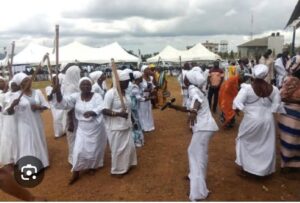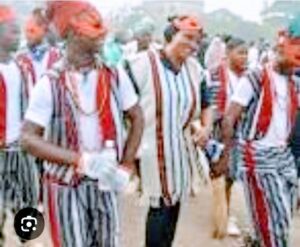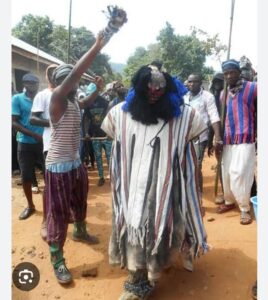

By Dada Ahmed
The Ebiras, a prominent group originating from the historically significant Jukun Kingdom, are renowned for their vibrant cultural festivals, which are celebrated throughout much of the year.
This they demonstrated in Okengwe district of Okene Local Government Area of kogi state recently as they role out different masquerades, glad in various beauful attire to entertain audience in a peaceful way.
The masquerades cashed in on the festival to solicit for financial appreciation from willing passers-by. When the request is turn down,the masquerades show no qualms.

Photo credit:, Facebook.
But while these festivals are entertaining and culturally rich, experts argue that they lack modernization.
ChatGPT, an advanced AI language model, aptly describes cultural festivals as a cornerstone of communal life in Ebiraland, a region in central Nigeria known for its rich heritage and traditions. The language model highlights that these festivals, deeply rooted in history, serve as a conduit for transmitting values, beliefs, and customs from one generation to the next.

Photo credit: Facebook.
Preserving Heritage in a Modern Context
Modernization does not mean abandoning tradition; rather, it involves adapting cultural practices to contemporary contexts. Festivals such as the Eche-Ane festival, which celebrates the harvest season, and the Eku’echi festival, a rite of passage for boys, hold significant historical and cultural value. To successfully modernize these festivals, coordinated efforts by stakeholders are essential.

Incorporating modern elements, such as digital archiving, multimedia presentations, and interactive exhibits, can enhance the festivals’ appeal and foster a deeper appreciation for the heritage of the Ebiras. These updates will not only preserve the essence of the festivals but also make them more accessible and engaging for younger generations.
Enhancing Economic Opportunities
Modernizing cultural festivals can create substantial economic opportunities for the local community in Kogi Central Senatorial District. By integrating technology and social media, these festivals can reach a wider audience, attracting tourists and cultural enthusiasts from around the world. This influx of visitors can boost the local economy through increased demand for accommodation, food, and cultural products, thus enhancing the tourism potential of Kogi State.
Moreover, promoting Ebiraland’s cultural festivals on digital platforms can attract sponsorships and partnerships, providing additional financial support for preserving and enhancing these events.
Promoting Cultural Exchange and Understanding
Incorporating modern elements into traditional festivals facilitates cultural exchange and fosters global understanding. Live streaming festival events and activities on social media platforms can connect Ebiraland with a global audience, promoting intercultural dialogue and appreciation. Showcasing their unique cultural practices to the world, the people of Ebiraland can contribute to a richer, more diverse global cultural landscape, encouraging mutual respect and understanding among different cultures.
Engaging Younger Generations
One of the critical challenges facing cultural festivals in Ebiraland is engaging younger generations. Many young people find traditional practices outdated. By modernizing these festivals with digital storytelling, virtual reality experiences, and interactive apps, organizers can capture the interest and imagination of young people. Engaging the youth is crucial for the continuity of cultural practices, as they are the future custodians of these traditions.
Strengthening Community Bonds
Modernizing cultural festivals can also strengthen community bonds by fostering a sense of collective identity and pride. When communities come together to celebrate their heritage in innovative ways, it reinforces social cohesion and solidarity. Modernized festivals that include contemporary music, fashion, and art can appeal to a broader section of the community, bridging generational and cultural gaps, and ensuring that everyone feels a part of the cultural narrative.
Addressing Contemporary Issues
Modern cultural festivals can also serve as platforms to address contemporary social issues in Ebiraland. Integrating themes such as environmental sustainability, gender equality, and social justice into festival narratives and activities can raise awareness and promote positive change. For example, incorporating environmental conservation efforts into the Eche-Ane festival can highlight the importance of sustainable agricultural practices.
Conclusion
Modernizing cultural festivals in Ebiraland is not merely an option but a necessity in today’s fast-evolving world. By embracing modern elements while preserving traditional practices, cultural festivals in Ebiraland will remain relevant, vibrant, and meaningful. Modernization enhances economic opportunities, promotes cultural exchange, engages younger generations, strengthens community bonds, and addresses contemporary social issues. These are the potential advantages Ebiraland stands to gain if its cultural festivals are modernized to global best practices.
As Ebiraland navigates the complexities of the modern world,
it is hoped that the modernization of its cultural festivals will ensure the continuation and thriving of its rich heritage, inspiring future generations and enhancing a better understanding and appreciation of the Ebiras and their culture and traditions.
In all, while it is acknowledged that no culture in the world can eclipse the cultural festivals of Ebiraland, inview of their rich, the thrust of this piece stresses the need to modernize them to meet the aims and objectives of enhancing the identify of the ebiras among other benefits.
Much acknowledgement goes to ChatGPT for providing relevant information that enriches the success of this piece.
Dada Ahmed, publishes The Reporters.


